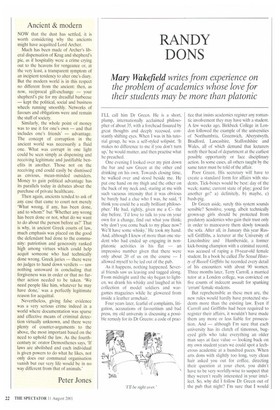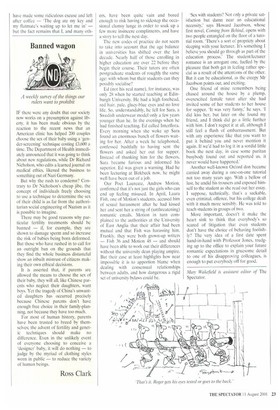RANDY DONS
Mary Wakefield writes from experience on the problem of academics whose love for their students may be more than platonic
I'LL call him Dr Green. He is a short, plump, internationally acclaimed philosopher of about 35, with a forehead fissured by great thoughts and deeply recessed, constantly shifting eyes. When I was in his tutorial group, he was a self-styled solipsist. 'It makes no difference to me if you don't turn up,' he would mutter, and then practise what he preached.
One evening I looked over my pint down the bar and saw Green at the other end drinking on his own. Towards closing time, he walked over and stood beside me. He put one hand on my thigh and the other on the back of my neck and, staring at me with such vacuous intensity that it was obvious he barely had a clue who I was, he said, 'I think you could be a really brilliant philosopher.' He had, rightly, given me a Cthe day before. 'I'd love to talk to you on your own for a change, find out what you think; why don't you come back to my place now? We'll have some whisky.' He took my hand. And, although I knew of more than one student who had ended up engaging in nonplatonic activities in his flat — an impressive number given that there were only about 20 of us on the course — I allowed myself to be led out of the pub.
As it happens, nothing happened. Several friends saw us leaving and tagged along. From midnight until the sky began to lighten, we drank his whisky and laughed at his collection of model soldiers and wargames magazines while he glowered from inside a leather armchair.
Four years later, fearful of complaints, litigation, accusations of favouritism and bad press, my old university is discussing a possible remedy for its Dr Greens: a code of prac tice that insists academics register any romantic involvement they may have with a student. A few weeks ago, Birkbeck College in London followed the example of the universities of Northumbria, Greenwich, Aberystwyth, Bradford, Lancashire, Staffordshire and Wales, all of which demand that lecturers notify their head of department at the earliest possible opportunity or face disciplinary action. In some cases, all others taught by the same tutor must be told of the affair.
Poor Green. His secretary will have to create a standard form for affairs with students. Tick-boxes would be best: day of the week; name; current state of play; good for another go? a) definitely, b) maybe, c) bush-pig.
Dr Green aside, surely this system sounds sensible? Sensitive, young, albeit technically grown-up girls should be protected from predatory academics who gain their trust only in order to manoeuvre them slowly towards the sofa. After all, in January this year Russell Griffiths, a lecturer at the University of Lincolnshire and Humberside, a former kick-boxing champion with a criminal record, was accused of raping a 19-year-old female student. In a book he called The Sexual History of Russell Gnffiths he recorded every detail of his encounters with about 90 women. Three months later, Terry Carroll, a married tutor at a London college, was convicted on five counts of indecent assault for spanking 'errant' female students.
But reprehensible as these men are, the new rules would hardly have protected students more than the existing law. Even if Carroll and Griffiths had been required to register their affairs, it wouldn't have made them any more or less liable for prosecution. And — although I'm sure that each university has its clutch of timorous, bugeyed girls who take everything an older man says at face value — looking back on my own student years we could spot a lecherous academic at a hundred paces. When arts dons with slightly too long, very clean hair asked you out for coffee, directing their question at your chest, you didn't have to be very worldly-wise to suspect that they weren't really interested in your intellect. So, why did I follow Dr Green out of the pub that night? I'm sure that I would have made some ridiculous excuse and left after coffee — 'The dog ate my key and my flatmate's waiting up to let me in' — but the fact remains that I. and many oth ers, have been quite vain and bored enough to risk having to sidestep the occasional clumsy lunge in order to soak up a few more insincere compliments, and have a story to tell the next day.
The new codes of practice do not seem to take into account that the age balance in universities has shifted over the last decade. Nearly half of those enrolling in higher education are over 22 before they begin their course. Their tutors are often postgraduate students of roughly the same age: with whom but their students can they possibly socialise?
Ed (not his real name), for instance, was only 28 when he started teaching at Edinburgh University. He had a high forehead, red hair, pale, gluey-blue eyes and no love life. So. understandably, he fell for Sara, a Swedish underwear model only a few years younger than he. In the evenings when he had finished teaching. Ed called Interflora. Every morning when she woke up Sara found an enormous bunch of flowers waiting for her. After a week he telephoned, confessed bashfully to having sent the flowers and asked her out for supper. Instead of thanking him for the flowers, Sara became furious and informed his superior. Ed was given a warning. Had he been lecturing at Birkbeck now. he might well have been out of a job.
Our Poet Laureate, Andrew Motion, confirmed that it's not just the girls who can end up feeling misused. In April, Laura Fish, one of Motion's students, accused him of sexual harassment after he had kissed her and sent her a string of (unthreatening) romantic emails. Motion in turn complained to the authorities at the University of East Anglia that their affair had been mutual and that Fish was harassing him. Frankly, they were both grown-up writers — Fish 36 and Motion 48 — and should have been able to work out their differences without the university dean playing umpire. But their case at least highlights how near impossible it is to apportion blame when dealing with consensual relationships between adults, and how dangerous a rigid set of university bylaws could be. 'Sex with students? Not only a private satisfaction but damn near an educational necessity,' says Howard Jacobson, whose first novel, coming from Behind, opens with two people entangled on the floor of a tutorial room. There's a sort of propriety about sleeping with your lecturer. It's something I believe you should go through as part of the education process.' The student/lecturer romance is an arrogant one, fuelled by the pleasure that both get in feeling rather special as a result of the attentions of the other. But it can be educational, as the creepy Mr Jacobson points out, and exciting.
One friend of mine remembers being chased around the house by a plump, overexcited female tutor after she had invited some of her students to her house for supper. 'It was very funny,' he says. 'I did kiss her, but later on she found my friend, and I think did go a little further with him. I don't regret it at all, although I still feel a flush of embarrassment. But with any experience like that you want to put it behind you and never mention it again. If we'd had to log it in a sordid little book the next day, in case some puritan busybody found out and reported us, it never would have happened.'
Another well-known Oxford don became carried away during a one-on-one tutorial not too many years ago. With a bellow of lust, he undid his trousers and exposed himself to the student as she read out her essay. I suppose, technically, that's a sackable, even criminal, offence, but his college dealt with it much more sensibly. He was told to teach students in groups of two.
More important, doesn't it make the heart sink to think that everybody's so scared of litigation that even students don't have the choice of behaving foolishly'? The very idea of a first date spent hand-in-hand with Professor Jones. trudging up to the office to explain your future romantic expectations in gruesome detail to one of his disapproving colleagues, is enough to put everybody off for good.
Mary Wakefield is assistant editor of The Spectator.



























































 Previous page
Previous page